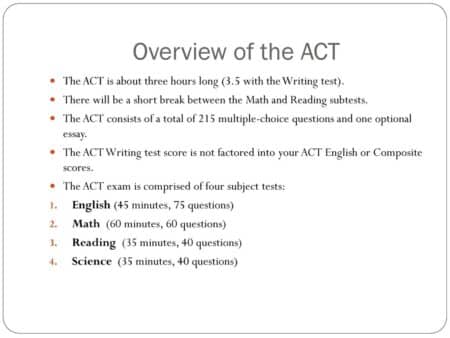
ACT Subject Test English 1
ACT Subject Test English 1 has a few unique features. For starters, the ACT uses more complex grammar questions than the SAT. The SAT tests you on your ability to understand the relationships between sentences and clauses, so you need to be able to identify shifts in construction and apply that knowledge. The ACT, on the other hand, measures how well you can answer questions that test your understanding of grammatical rules and the construction of sentences.
There are five subsections on ACT English, which test your understanding of grammar and punctuation conventions. The ACT’s grading process is based on a number of criteria, including sentence structure and correct usage. If you get a score of a low number on the ACT English test, you’ll have to work harder to make up for the deficiencies. However, a high score on a subject-specific standardized test is a good indicator of how well you’ll do in college.

The ACT Subject Test English 1 is divided into four main sections
The English section is similar to other standardized tests and will consist of 75 multiple-choice questions. The goal of the test is to measure your reading, writing, and comprehension of grammar. This section will last approximately 45 minutes. You’ll need to prepare well for this section. To help you prepare for the ACT, you can take a practice test before taking the actual test.
The ACT Subject Test English 1 consists of five reading selections. Questions will ask you to evaluate your ability to comprehend the passages and spot grammar errors. A large part of the content is the Conventions of Standard England category, which assesses your comprehension of grammar and sentence structure. This section contains between 51 and 56 percent of questions on the ACT Subject Test English 1. While the ACT uses different formats for each section, the format and content of the test are similar.
ACT English has five sub-sections
Each subtest will include five essays and 75 multiple-choice questions. The ACT English 1 tests your understanding of standard written English. The ACT English Test includes 5 passages with fifteen questions each and 75 multiple-choice questions. The questions are broken down into Usage/Mechanics and Rhetorical Skills. The ACT test measures your ability to analyze a passage.
The ACT English section is comprised of 75 multiple-choice questions that measure your ability to understand and analyze written and spoken language. There are three sub-sections on the ACT English exam: Conventions of Standard English, Usage/Mechanics, and Rhetorical Skills. The ACT Subject Test is divided into two sections: each contains four questions.
The ACT English test has five sub-sections:
Conventions of Standard English, Sentence Structure, and Rhetorical Skills. The questions on the ACT test will assess your understanding of the structure of sentences and grammar. The ACT English exam will also include the use of transitional words. If you’re a student struggling with these sub-sections, practice the ACT English test to see where you fall short.
ACT Subject Test English 1 will feature five reading selections. It will test your reading comprehension and spotting errors in written work. The Conventions of Standard English sub-section will make up over half of the test’s content and between 51 and 56 percent of the questions. For ACT Subject Test, English will be a key part of your academic success. You can improve your chances by improving your score with the help of ACT subjects.
The ACT English test will include five essays and multiple-choice questions
There are four main sections of the test: the Rhetorical Skills sub-section tests your understanding of grammar rules and punctuation. The Rhetorical Skills sub-section will test your ability to apply these rules and conventions in writing. This category will make up more than half of the ACT’s content. In addition, it contains between 51 and 56 percent of the test’s questions.
Taking an ACT Subject Test English 1 practice test will give you a feel for the questions on the exam and determine what areas need improvement. A free diagnostic test will help you see where your weak points are so you can improve your study methods and boost your score. You can also use this diagnostic test to identify areas of the test that not yet covered in your studies. This will also allow you to identify what sections of the ACT English exam you should study for.

Comments (0)